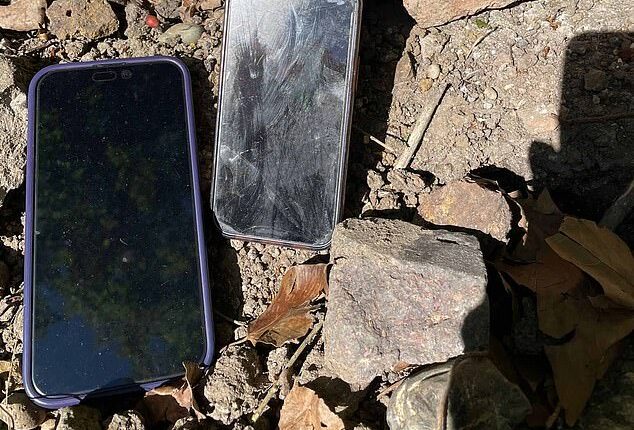It gives a whole new meaning to ‘getting your hands dirty’: London’s phone thieves are burying ill-gotten devices in a community garden in a bid to evade justice.
Phone-swipers in the heart of London’s West End have been hiding devices in the dirt of the Phoenix Garden while waiting for police heat to cool off.
They then wait out the ‘golden hour’ in the immediate aftermath of the theft, when officers stand the best chance of catching them.
After police lose interest, criminals return to dig up their ill-gotten gains uninterrupted before selling them on abroad.
Managers at the charitable plot, just metres from Charing Cross Road behind the theatre it is named after, say volunteers have encountered people digging up phones.
Sometimes, they have even found the devices themselves as they tend to the gardens, or found owners scrabbling in the dirt after tracking their phones down.
Unfortunately, staff say say they are struggling to convince the Metropolitan Police to take the issue seriously or even help to reunite people with their devices – and with that, years of photos, videos and memories.
Crooks are employing the tactic, first reported by local news outlet London Centric, to reduce the risk of being caught with a bag full of devices – but the Mail has found that even purses are being lobbed in the bushes, seemingly after being pinched.
Recent high-profile Metropolitan Police publicity campaigns have seen e-bike-riding crooks tracked down by police officers who dramatically tear open backpacks to find phones rolled up in tinfoil to block their signals.

A pair of stolen phones found buried in the shallow dirt of the Phoenix Garden in London’s West End

A high-end Coach card wallet that was found among the dirt of the Phoenix Garden – containing Korean bank cards
But by hiding the phones – or even simply lobbing them over the fence into an out-of-sight area of grass – there’s little chance of being caught red-handed.
Louise Gates, the manager of the Phoenix Garden, began keeping a log of phones found buried inch-deep in dirt in January last year – until she lost track.
It’s happening so often that staff now make sweeping for phones part of their morning duties.
She has tried to reunite phones with their owners – failing which, she hands them in at the local police station. Sometimes, she resorts to leaving the device on the counter, with no officers at the desk.
She told the Daily Mail: ‘I’ve been here for two years and it’s been happening consistently ever since I started.
‘They take all types of phones from people and just chuck them through the fences. Sometimes they don’t even bother burying them.
‘We find a lot in the winter though when the season changes or we replant the flowers because we end up digging up a massive haul of stolen phones.
‘We’ve reported it to the police but it’s impossible to trace. Police are trying to clamp down on antisocial behaviour more now I think. I used to make a note of it and how many I’d found in one year, but I lost track.
‘In the morning I find phones thrown in through the fence overnight because if they don’t want the phone or phone cases they just throw them through.
‘I’ve found probably 40 phone cases – which means they’ve stolen that number of phones and just chucked the cases.
‘They wrap the phones in tinfoil sometimes too and bury them deep so they don’t get damp – that makes me think it’s an organised, sophisticated thing and not just an individual or a one-off.’

Louise Gates, manager of the Phoenix Garden, is struggling to get the Met Police to take an interest in the phones being found

Criminals have even been dumping wallets and the contents of stolen handbags in the bushes (pictured: a wallet found by a volunteer)

Teacher Catherine Butler had her phone stolen in the West End by a phone thief who dumped it in the nearby Phoenix Garden

Criminals have been burying phones in the Phoenix Garden (pictured) and coming back to retrieve them another day

The city centre garden (pictured) is maintained by volunteers – who have been finding phones in the dirt every morning
She revealed to the Mail that volunteers were even finding wallets and handbags – or at least their contents.
Among those shown to us were a high-end card wallet made by luxury brand Coach, containing Korean bank cards.
‘We even get makeup a lot because women’s bags get stolen more,’ Ms Gates added.
‘We also have to be careful about who comes in – we get a lot of homeless or aggressive people coming in, every day.
‘Sometimes people will get rid of the phones quickly because if the police come they don’t want to be found with it on their person.’
She has found the task of getting the Met Police to care difficult, adding. ‘They really don’t care. (Their attitude is) “well, what can we do?”‘
Among those to have her phone stolen and hidden was Catherine Butler, who was tracked down by London Centric after her device was found by volunteers in the dirt.
The teacher had her phone stolen by a pickpocket on the evening of October 3 – and believed she would never be reunited with it.
She did not report the theft to police, instead replacing the phone and its SIM card.
Upon returning to the garden, spotted a man cycling around the perimeter, looking through the fence, seemingly looking for something in the bushes.
‘It feels weird, coming back to this area – I don’t feel the same as I used to before,’ she said.
She added of the Phoenix Garden: ‘Somewhere like this, it’s such a nice little oasis.
‘But that also makes it a bit of a target for people at night, to feel like they can come here and not be spotted.
‘It just makes you think how organised these sorts of setups are.’

Some criminals aren’t even bothering to bury their ill-gotten gains – instead dropping them behind hedges through the fences (pictured)

The area of Shaftesbury Avenue where Catherine Butler had her phone stolen earlier this month

Earlier this month, the Metropolitan Police announced it had busted one of the biggest phone-theft rings in London (pictured: Taser-toting officers arresting ‘Heron’ and ‘Seagull’, two of the suspected ringleaders)
And a young couple passing through the gardens added to us: ‘Everyone we know has had their phone stolen at one point.
‘You have to be careful – I keep my pockets closed and bag zipped up. It is a massive problem in the city, but it’s just normal to us now.’
Earlier this month, the Met boasted it had smashed one of the biggest phone gangs in the country, alleged to be responsible for sending thousands of phones overseas to the likes of China and Algeria where devices are sold or stripped for parts.
A series of dawn raids saw the alleged ringleaders rounded up and arrested in connection with what detectives said was the exporting of some 40,000 devices to Hong Kong over a period of time.
One raid witnessed by the Daily Mail saw 30 specialist public order officers storm a house in Enfield, North London, that was home to 13 people across three generations.
A Bulgarian man and woman suspected of being involved in the ring were arrested and led out of the house in handcuffs.
Beforehand, the force had been criticised for failing to grasp the growing phone theft crisis in the capital: more than 80,000 devices had been stolen in London in 2024.
It was only able to crack the gang because of the efforts of one persistent woman who tracked her phone to a warehouse by Heathrow Airport and found it with 894 other devices in a box bound for Hong Kong.
That led detectives to ambush a people carrier containing two men nicknamed Heron and Seagull who are said to be the leaders of the gang. They were found in a mobile ‘chop shop’ that was being used to disable and move stolen devices.
Inquiries led them to a high-rise building in Hong Kong – which an undercover Mail operation had also discovered when our reporters traced a phone stolen from a Baker Street estate agents to the other side of the world.
They also discovered the structure of the gang: foot-soldiers earning £300-500 for every phone they steal; middlemen who collect the stolen devices, and exporters who then send the devices abroad.
Unlocked iPhones are lucrative in Africa, where Apple does not have a large commercial footprint, and China, where they can be used to circumvent the so-called Great Firewall and access Western media.
Commissioner Sir Mark Rowley said it had been the ‘biggest ever counter-mobile-phone-theft operation in the UK and probably the world’.
But phone security expert David Rogers, who used to lead on fraud and security for mobile phone trade body GSMA, has branded the Met’s recent high-visibility efforts as ‘stunt policing’.

Some of the bundles of phones wrapped in tin foil seized in the Met’s Operation Echosteep

Undercover Mail reporters took this photo of phones inside the same office block in Hong Kong where Heron and Seagull had allegedly been sending devices stolen on Britain’s streets

Some of the more than 500 mobile phone handsets seized by the City of London Police, which remain languishing in evidence bags because owners can’t be traced. (Pictured with some of the handsets is Sergeant Stu Ford)
‘The police haven’t really paid a lot of attention to it as an issue,’ he said, adding: ‘It’s almost like stunt policing. It should be business as usual. This is a major issue for many people in London. They need to take it seriously.’
He compares the Phoenix Garden tactic to how car theft gangs operate – parking a stolen car for a day or so to see if it has a tracker fitted, and if anyone comes looking for it. After that, they can move it on with relatively little fear.
‘You don’t necessarily know as a phone thief if Find My is turned on or not,’ he said, referring to the location tracking software bolted in with modern smartphones.
‘It’s a risk for the thief that they get tracked down by the police. Being able to dispose of it quickly in the ‘golden hour’ for the police means that you’re not carrying anything if the police stop you.’
The Met, however, says phone makers such as Apple and the myriad of firms making devices running Google’s Android software need to take greater responsibility for making the devices ‘theft-proof’.
It has urged Apple to print the IMEI – the unique identifier for each phone – on the back of each device so they can be universally locked down with ease in the event they are stolen.
Apple stopped printing the ID number with the release of the iPhone 7 – making the task of reuniting them with owners a headache.
Last week, the Science, Innovation and Technology parliamentary committee wrote to Home Secretary Shabana Mahmood expressing its concerns over the lack of action by tech firms.
It appeared to suggest that the firms – which stonewalled questions from the committee on why they weren’t ‘designing out’ theft – preferred to profit from victims of crime resorting to buying new phones.
Conservative MP Kit Malthouse, addressing an Apple representative in one session on the matter, said: ‘The concern is that, actually, it feels to a lot of people like you are dragging your feet and that sitting behind this is a very strong commercial incentive.
‘The fact that £50m-worth of phones are stolen in London every year means that, if that stopped, £50m of sales would be depressed.’
Google and Samsung, in submissions to the committee, said they had taken extensive steps to counter phone theft; Apple said it would consider whether to implement IMEI-blocking functionality in its systems.
The Daily Mail has contacted the Met Police for comment.









